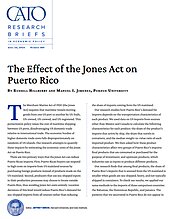The Merchant Marine Act of 1920 (the Jones Act) requires that maritime vessels moving goods from one US port to another be US-built, US-owned, US-crewed, and US-registered. This protectionist policy raises the cost of maritime shipping between US ports, disadvantaging US domestic trade relative to international trade. The economic burden of higher domestic trade costs falls disproportionately on residents of US islands. Our research attempts to quantify these impacts by estimating the economic costs of the Jones Act on Puerto Rico.
There are two primary ways that the Jones Act can reduce Puerto Rican imports. First, Puerto Rican buyers can respond to high costs on imports from US mainland sources by purchasing foreign products instead of products made on the US mainland. Second, producers that use sea-shipped inputs in their production processes may choose to locate outside Puerto Rico, thus avoiding Jones Act costs entirely. Location decisions of this kind would reduce Puerto Rico’s demand for sea-shipped imports from all sources rather than reducing the share of imports coming from the US mainland.
Our research studies how Puerto Rico’s demand for imports depends on the transportation characteristics of each product. We used data on US imports from sources other than Mexico and Canada to calculate the following characteristics for each product: the share of the product’s imports that arrive by ship, the share that travels in containers, and the median weight-to-value ratio of each imported product. We then asked how these product characteristics affect two groups of Puerto Rico’s imports: final products that are consumed or purchased for the purpose of investment; and upstream products, which industries use as inputs to produce different products.
Our research finds that among final products, the share of Puerto Rico’s imports that is sourced from the US mainland is smaller when goods are sea-shipped, heavy, and not typically shipped in containers. To check our results, we applied our same methods to the imports of three comparison countries: the Bahamas, the Dominican Republic, and Jamaica. The patterns that we uncovered in Puerto Rico do not appear in these countries, which suggests they are due to the Jones Act rather than to other anomalies in US-Caribbean trade.
Our results show that among upstream products, Puerto Rico’s imports exhibit a strong bias against imports of sea-shipped products from all sources, rather than a bias specifically against sea-shipped products from the US mainland. Our research estimates that Puerto Rico’s imports of sea-shipped upstream inputs are 77 percent lower than imports of air-shipped inputs. Our results do not suggest a similar bias in the imports of the Bahamas, the Dominican Republic, or Jamaica. The effects that we estimated in Puerto Rico’s imports are consistent with the Jones Act shifting Puerto Rico’s industrial structure away from sectors that use sea-shipped inputs, though other policies may have contributed to this outcome.
We used others’ research on how imports respond to tariffs and other trade costs to estimate the size of tariffs that would have had equivalent effects on Puerto Rico’s imports as those that we attribute to the Jones Act. Our calculations suggest that the costs imposed by the Jones Act are equivalent to those of a 30.6 percent average tariff on final products coming from the US mainland. Using these tariff-equivalent estimates, we calculated that the Jones Act costs the Puerto Rican economy $1.4 billion annually (in 2016 dollars). Puerto Rican households bear $692 million of this burden, a figure that represents 1.1 percent of household expenditure, or $203 per citizen per year. Estimating the burden on private investment, we calculated that purchases of capital goods by the private sector cost 3 percent more than they would have if the Jones Act did not exist.
The bias against sea-shipped inputs in Puerto Rican imports is suspiciously large, but it is difficult to attribute this finding directly to the Jones Act. There is no tendency for Puerto Rican importers to substitute away from US mainland sources in upstream products, so the methods that we used to measure the burden of the Jones Act among final products cannot be credibly applied to upstream products. However, the relative absence of sea-shipped upstream inputs in Puerto Rico’s imports suggests the presence of an important distortion that has affected the industrial structure of the island. If the Jones Act is responsible for even a small portion of these effects, it has imposed a large additional burden on Puerto Rico’s long-term development.
NOTE
This research brief is based on Russell Hillberry and Manuel I. Jimenez, “Economic Consequences of Cabotage Restrictions: The Effect of the Jones Act on Puerto Rico,” working paper, Purdue University, April 2024.

This work is licensed under a Creative Commons Attribution-NonCommercial-ShareAlike 4.0 International License.
